
awesome-AIOps
A curated list of awesome academic researches and industrial materials about Artificial Intelligence for IT Operations (AIOps).
Stars: 163
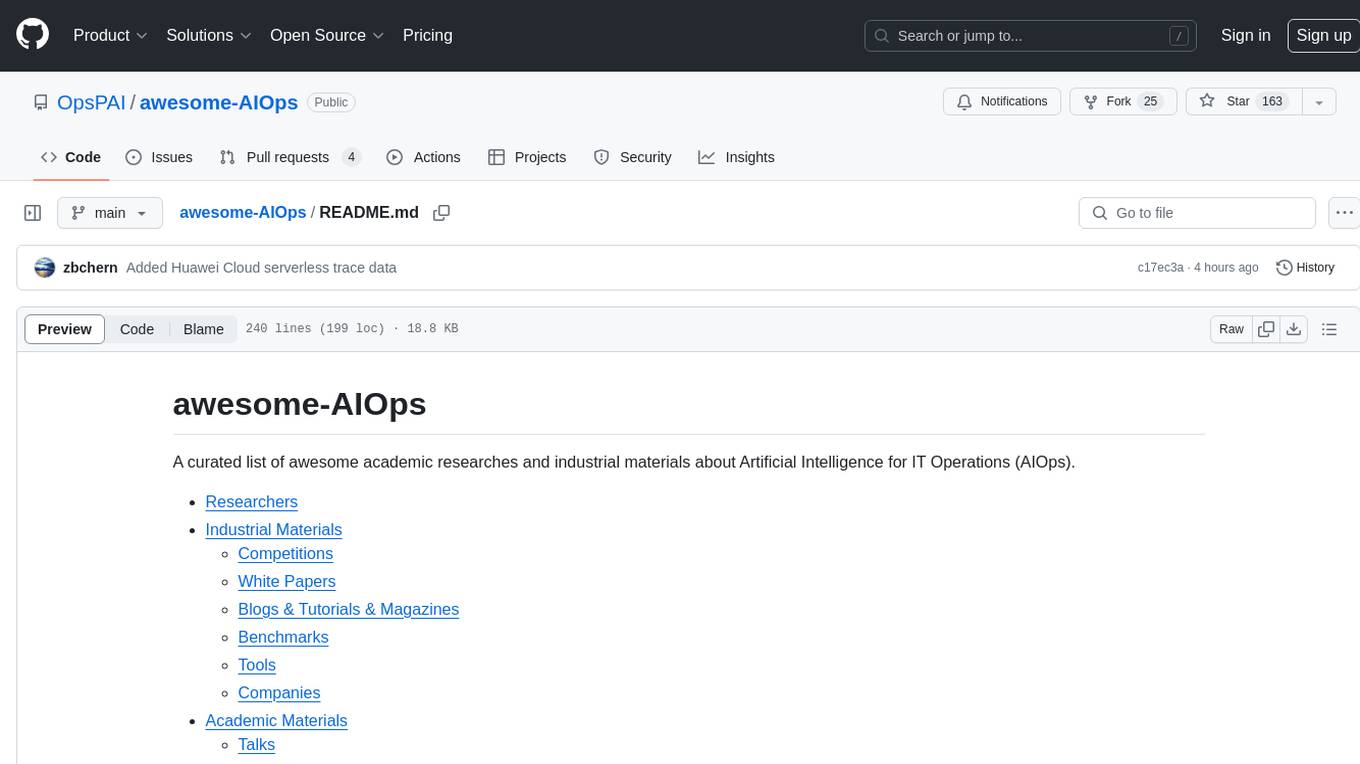
awesome-AIOps is a curated list of academic researches and industrial materials related to Artificial Intelligence for IT Operations (AIOps). It includes resources such as competitions, white papers, blogs, tutorials, benchmarks, tools, companies, academic materials, talks, workshops, papers, and courses covering various aspects of AIOps like anomaly detection, root cause analysis, incident management, microservices, dependency tracing, and more.
README:
A curated list of awesome academic researches and industrial materials about Artificial Intelligence for IT Operations (AIOps).
| China (& HK SAR) | |||
|---|---|---|---|
| Michael R. Lyu, CUHK | Dongmei Zhang, Microsoft | Pengfei Chen, SYSU | Dan Pei, Tsinghua |
| Xin Peng, Fudan | |||
| USA | |||
| Ryan Huang, JHU | Yingnong Dang, Microsoft | Christina Delimitrou, MIT EECS | |
| Europe | |||
| Odej Kao, TU Berlin | |||
| Australia | |||
| Hongyu Zhang, UON |
- [AIOps Challenge] A series of AIOps competitions hosted by Tsinghua University
- [PAKDD2020] Alibaba AIOps Competition
- [VMware] Proactive Incident and Problem Management
- [GREATOPS 高效运维社区] 《企业级 AIOps 实施建议》白皮书
- [Awesome Open Source] Aiops Handbook
- [Moogsoft] What is AIOps?
- [Tsinghua University] 清华裴丹:AIOps落地的15条原则
- [Tsinghua University] 清华裴丹:AIOps效果落地最后一公里
- [Alibaba Cloud] 基于大数据的智能网络分析-齐天
- [Microsoft] Advancing Azure service quality with artificial intelligence: AIOps
- [Grafana] GrafanaCON: Grafana Observability Conference 2022
- [InfoQ] 2023,可观测性需求将迎来“爆发之年”?
- [Alibaba] 阿里云张建锋谈新型计算体系:云正在重构硬件、软件和终端世界
- [Cornell] DeathStarBench (An open-source benchmark suite for cloud microservices)
- [Google Cloud] Online Boutique (A microservices demo application)
- [Fudan] Train Ticket (A benchmark microservice system)
- [Weaveworks] Sock Shop (A microservices demo application)
- [Log Analytics] LogPAI
- [AI for Cloud Operation] OpsPAI
- [Outlier Detection] PyOD
- [Anomaly Detection] ADTK
- [Anomaly Detection] PySAD
- [Online Machine Learning] River
- [Online Machine Learning] scikit-multiflow
- [Fault Injection] Chaos Mesh
- [Fault Injection] ChaosBlade
- [Container Monitoring] cAdvisor
- [Performance Monitoring] Netdata
- [Anomaly Detection Labeling Tool] Microsoft TagAnomaly
- [Serverless App Dev. Framework] AWS Serverless Application Model (AWS SAM)
- [Performance Testing Tool] Locust
- [Alibaba Java Diagnostic Tool] Arthas
- Datadog: A monitoring and security platform for cloud applications
- 必示 bizseer
- 日志易
- 博睿数据
- 听云 TINGYUN: 端到端的全平台应用性能管理系统
- Loom Systems
- ICSE21 Workshop on Cloud Intelligence
- AAAI-20 Workshop on Cloud Intelligence
- AIOPS 2020 (International Workshop on Artificial Intelligence for IT Operations)
- [arXiv '23] AI for IT Operations (AIOps) on Cloud Platforms: Reviews, Opportunities and Challenges
- [CSUR '22] Anomaly Detection and Failure Root Cause Analysis in (Micro) Service-Based Cloud Applications: A Survey
- [ASE '22] Going through the Life Cycle of Faults in Clouds: Guidelines on Fault Handling
- [arXiv '21] Experience Report: Deep Learning-based System Log Analysis for Anomaly Detection
- [CSUR '21] A Survey on Automated Log Analysis for Reliability Engineering
- [ESEC/FSE '20] Towards intelligent incident management: why we need it and how we make it
- [arXiv '20] A Systematic Mapping Study in AIOps
- [ICSE '19] AIOps: Real-World Challenges and Research Innovations
- [HotOS '19] What bugs cause production cloud incidents?
- [ISSRE '16] Experience Report: System Log Analysis for Anomaly Detection
- [ASE '13] Software analytics for incident management of online services: An experience report
- [arXiv '22] Constructing Large-Scale Real-World Benchmark Datasets for AIOps
- [ASPLOS '19] An Open-Source Benchmark Suite for Microservices and Their Hardware-Software Implications for Cloud and Edge Systems
- [ISSTA '24] LILAC: Log Parsing using LLMs with Adaptive Parsing Cache
- [arXiv '24] Exploring LLM-based Agents for Root Cause Analysis
- [arXiv '24] Nissist: An Incident Mitigation Copilot based on Troubleshooting Guides
- [arXiv '24] Automated Root Causing of Cloud Incidents using In-Context Learning with GPT-4
- [arXiv '23] Automatic Root Cause Analysis via Large Language Models for Cloud Incidents
- [arXiv '23] OpsEval: A Comprehensive Task-Oriented AIOps Benchmark for Large Language Models
- [arXiv '23] Xpert: Empowering Incident Management with Query Recommendations via Large Language Models
- [arXiv '23] Exploring the Effectiveness of LLMs in Automated Logging Generation: An Empirical Study
- [arXiv '23] Assess and Summarize: Improve Outage Understanding with Large Language Models
- [arXiv '23] Empower Large Language Model to Perform Better on Industrial Domain-Specific Question Answering
- [arXiv '23] Recommending Root-Cause and Mitigation Steps for Cloud Incidents using Large Language Models
- [SoCC '19] A System-Wide Debugging Assistant Powered by Natural Language Processing
- [ICSE-SEIP '22] Mining Root Cause Knowledge from Cloud Service Incident Investigations for AIOps
- [ICSE-SEIP '21] Neural knowledge extraction from cloud service incidents
- [arXiv '21] SoftNER: Mining Knowledge Graphs From Cloud Incidents
- [APPLSCI '20] A Causality Mining and Knowledge Graph Based Method of Root Cause Diagnosis for Performance Anomaly in Cloud Applications
- [ASPLOS '21] Sage: Practical & Scalable ML-Driven Performance Debugging in Microservices
- [ICDCS '21] Defuse: A Dependency-Guided Function Scheduler to Mitigate Cold Starts on FaaS Platforms
- [FSE '20] Graph-based trace analysis for microservice architecture understanding and problem diagnosis
- [OSDI '20] FIRM: An Intelligent Fine-grained Resource Management Framework for SLO-Oriented Microservices
- [ESEC/FSE '19] Latent Error Prediction and Fault Localization for Microservice Applications by Learning from System Trace Logs
- [TSE '18] Fault Analysis and Debugging of Microservice Systems: Industrial Survey, Benchmark System, and Empirical Study
- [ASE '21] AID: Efficient Prediction of Aggregated Intensity of Dependency in Large-scale Cloud Systems [code]
- [NSDI '07] X-Trace: A Pervasive Network Tracing Framework
- [HotNets '06] Discovering Dependencies for Network Management
- [ICSE '23] CONAN: Diagnosing Batch Failures for Cloud Systems
- [ISSRE '22] Share or Not Share? Towards the Practicability of Deep Models for Unsupervised Anomaly Detection in Modern Online Systems [code]
- [ICSE '22] Adaptive Performance Anomaly Detection for Online Service Systems via Pattern Sketching [code]
- [KDD '19] Time-Series Anomaly Detection Service at Microsoft
- [ESEC/FSE '18] Identifying Impactful Service System Problems via Log Analysis
- [CCS '17] DeepLog: Anomaly Detection and Diagnosis from System Logs through Deep Learning
- [SIGCOMM '23] Murphy: Performance Diagnosis of Distributed Cloud Applications
- [FSE '23] Nezha: Interpretable Fine-Grained Root Causes Analysis for Microservices on Multi-modal Observability Data
- [OSDI '18] Capturing and Enhancing In Situ System Observability for Failure Detection
- [ATC '23] AutoARTS: Taxonomy, Insights and Tools for Root Cause Labelling of Incidents in Microsoft Azure
- [ICSE '23] Incident-aware Duplicate Ticket Aggregation for Cloud Systems
- [SoCC '22] How to Fight Production Incidents? An Empirical Study on a Large-scale Cloud Service
- [DSN '22] Characterizing and Mitigating Anti-patterns of Alerts in Industrial Cloud Systems
- [USENIX ATC '21] Fighting the Fog of War: Automated Incident Detection for Cloud Systems
- [ASE '21] Graph-based Incident Aggregation for Large-Scale Online Service Systems
- [ASE '21] Groot: An Event-graph-based Approach for Root Cause Analysis in Industrial Settings
- [SIGCOMM '20] Scouts: Improving the Diagnosis Process Through Domain-customized Incident Routing
- [ASE '20] How Incidental are the Incidents?: Characterizing and Prioritizing Incidents for Large-Scale Online Service Systems
- [ESEC/FSE '20] Identifying linked incidents in large-scale online service systems
- [ESEC/FSE '20] Efficient incident identification from multi-dimensional issue reports via meta-heuristic search
- [ESEC/FSE '20] Real-time incident prediction for online service systems
- [ESEC/FSE '20] How to mitigate the incident? an effective troubleshooting guide recommendation technique for online service systems
- [ICSE '20] Understanding and Handling Alert Storm for Online Service Systems
- [HotOS '19] What bugs cause production cloud incidents?
- [ASE '19] Continuous Incident Triage for Large-Scale Online Service Systems
- [ICSE '19] An empirical investigation of incident triage for online service systems
- [WWW '19] Outage Prediction and Diagnosis for Cloud Service Systems
- [KDD '14] Correlating Events with Time Series for Incident Diagnosis
- [FAST '23] Perseus: A Fail-Slow Detection Framework for Cloud Storage Systems [data]
- [DSN '21] General Feature Selection for Failure Prediction in Large-scale SSD Deployment
- [TOSEM '20] Predicting Node Failures in an Ultra-Large-Scale Cloud Computing Platform: An AIOps Solution
- [ICDCS '20] Toward Adaptive Disk Failure Prediction via Stream Mining
- [VLDB '20] Diagnosing root causes of intermittent slow queries in cloud databases
- [USENIX ATC '19] IASO: A Fail-Slow Detection and Mitigation Framework for Distributed Storage Services
- [NSDI '18] Deepview: Virtual Disk Failure Diagnosis and Pattern Detection for Azure
- [ESEC/FSE '18] Predicting Node Failure in Cloud Service Systems
- [USENIX ATC '18] Improving Service Availability of Cloud Systems by Predicting Disk Error
- [NSDI '22] CloudCluster: Unearthing the Functional Structure of a Cloud Service
- [OSDI '20] Predictive and Adaptive Failure Mitigation to Avert Production Cloud VM Interruptions
- [SOSP '21] Understanding and Detecting Software Upgrade Failures in Distributed Systems
- [NSDI '20] Gandalf: An Intelligent, End-To-End Analytics Service for Safe Deployment in Large-Scale Cloud Infrastructure
- [CUHK] Loghub
- [Microsoft Azure] Azure Public Dataset
- [Tsinghua] AIOps Challenge Dataset
- [Google] Cluster Traces
- [Backblaze] Hard Drive Dataset
- [Baidu] SMART Dataset of PAKDD CUP 2020
- [Alibaba] SSD SMART logs and failure data
- [Alibaba] Alibaba Cluster Trace Program
- [CloudWise] GAIA Dataset
- [Huawei Cloud] Serverless traces
- [Coursera] Cloud-Based Network Design & Management Techniques
- [Tsinghua] AIOps Course of Tsinghua
For Tasks:
Click tags to check more tools for each tasksFor Jobs:
Alternative AI tools for awesome-AIOps
Similar Open Source Tools

awesome-AIOps
awesome-AIOps is a curated list of academic researches and industrial materials related to Artificial Intelligence for IT Operations (AIOps). It includes resources such as competitions, white papers, blogs, tutorials, benchmarks, tools, companies, academic materials, talks, workshops, papers, and courses covering various aspects of AIOps like anomaly detection, root cause analysis, incident management, microservices, dependency tracing, and more.
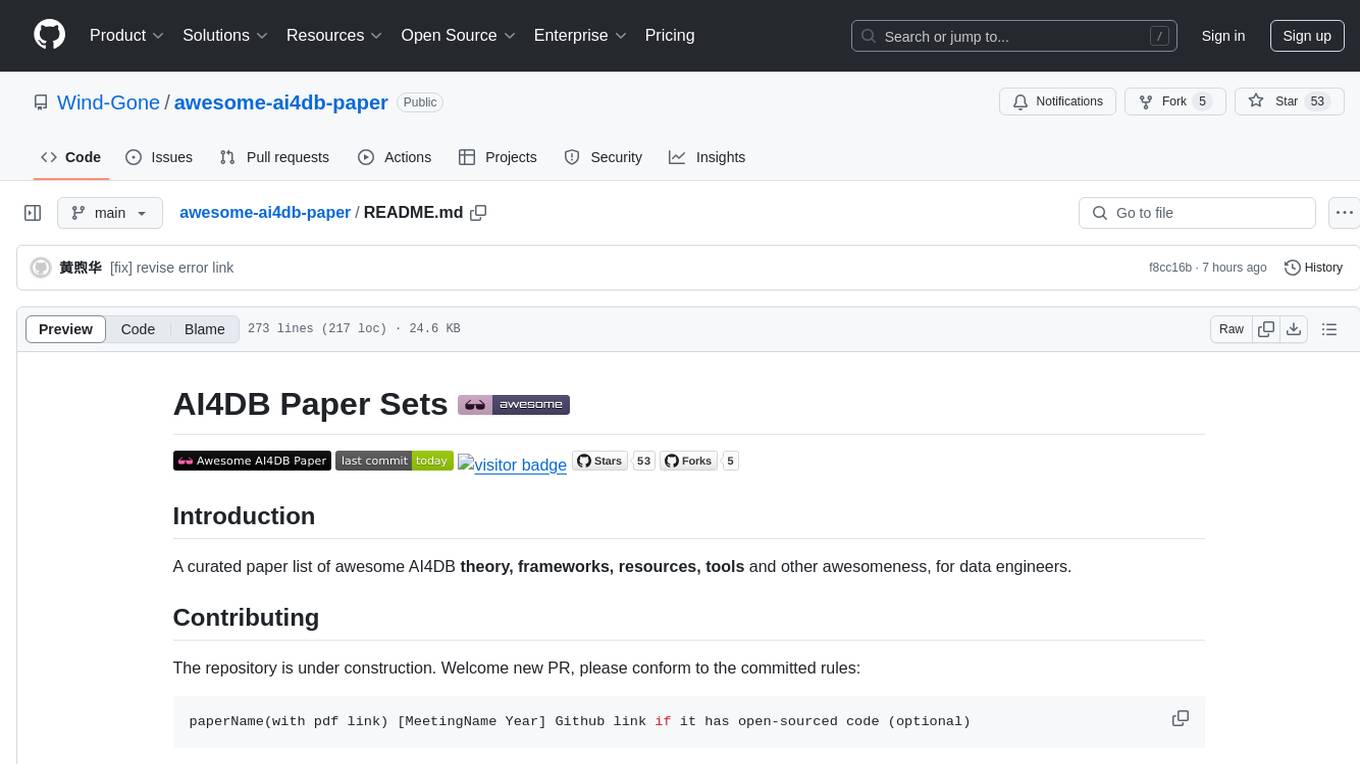
awesome-ai4db-paper
The 'awesome-ai4db-paper' repository is a curated paper list focusing on AI for database (AI4DB) theory, frameworks, resources, and tools for data engineers. It includes a collection of research papers related to learning-based query optimization, training data set preparation, cardinality estimation, query-driven approaches, data-driven techniques, hybrid methods, pretraining models, plan hints, cost models, SQL embedding, join order optimization, query rewriting, end-to-end systems, text-to-SQL conversion, traditional database technologies, storage solutions, learning-based index design, and a learning-based configuration advisor. The repository aims to provide a comprehensive resource for individuals interested in AI applications in the field of database management.
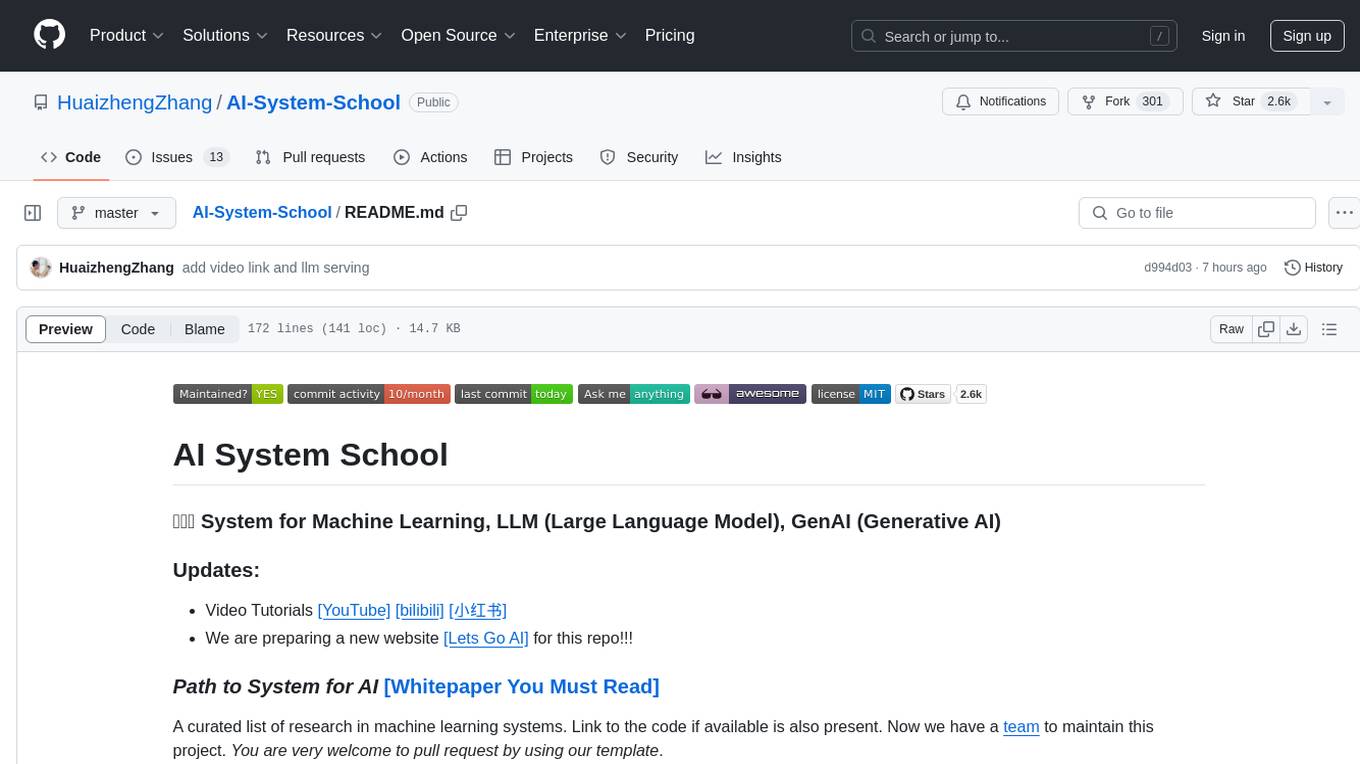
AI-System-School
AI System School is a curated list of research in machine learning systems, focusing on ML/DL infra, LLM infra, domain-specific infra, ML/LLM conferences, and general resources. It provides resources such as data processing, training systems, video systems, autoML systems, and more. The repository aims to help users navigate the landscape of AI systems and machine learning infrastructure, offering insights into conferences, surveys, books, videos, courses, and blogs related to the field.
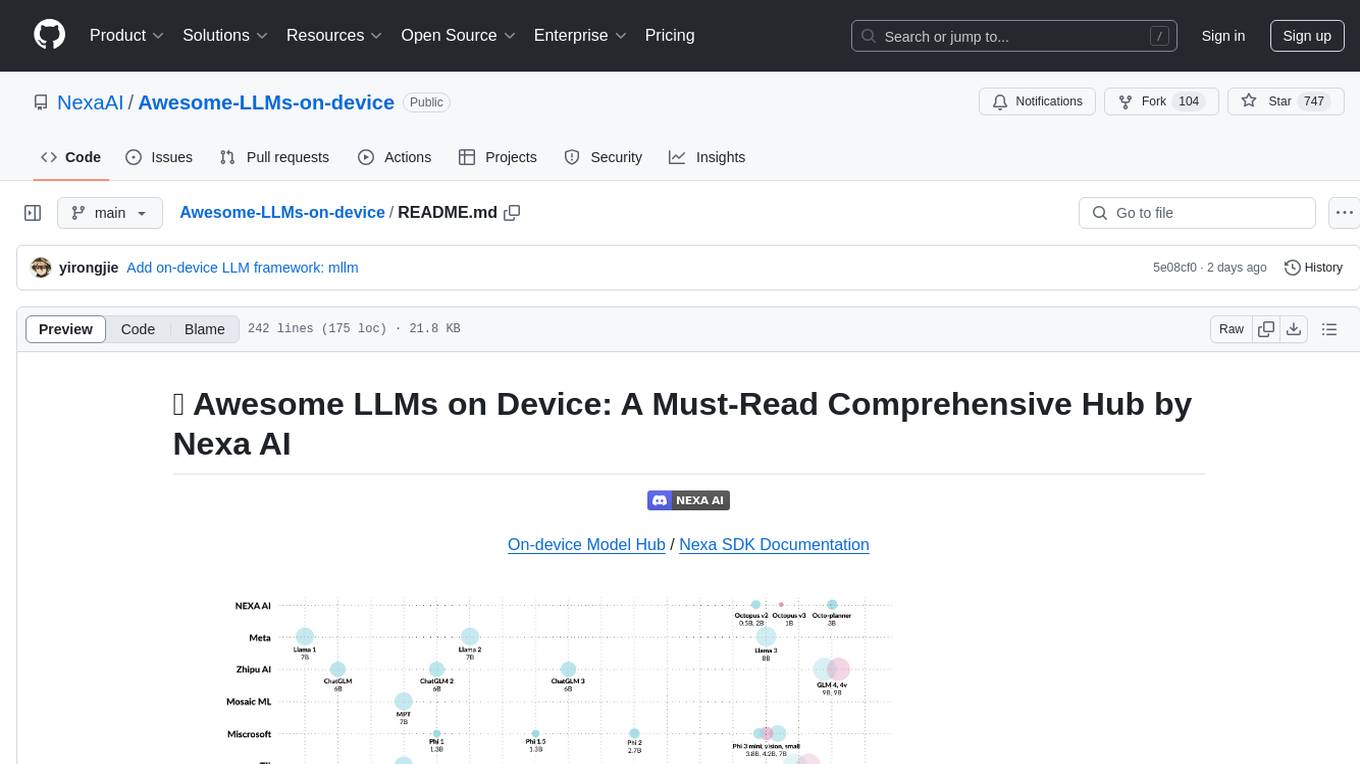
Awesome-LLMs-on-device
Welcome to the ultimate hub for on-device Large Language Models (LLMs)! This repository is your go-to resource for all things related to LLMs designed for on-device deployment. Whether you're a seasoned researcher, an innovative developer, or an enthusiastic learner, this comprehensive collection of cutting-edge knowledge is your gateway to understanding, leveraging, and contributing to the exciting world of on-device LLMs.
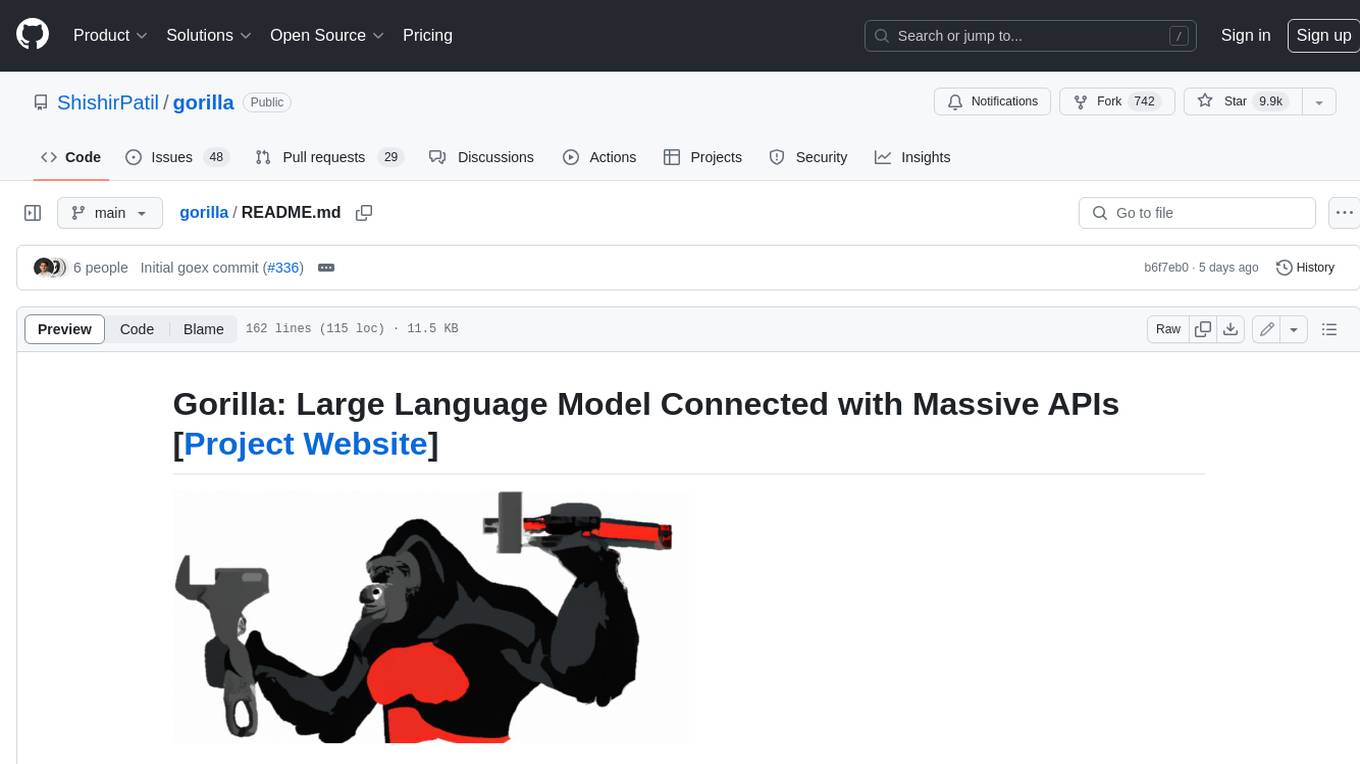
gorilla
Gorilla is a tool that enables LLMs to use tools by invoking APIs. Given a natural language query, Gorilla comes up with the semantically- and syntactically- correct API to invoke. With Gorilla, you can use LLMs to invoke 1,600+ (and growing) API calls accurately while reducing hallucination. Gorilla also releases APIBench, the largest collection of APIs, curated and easy to be trained on!
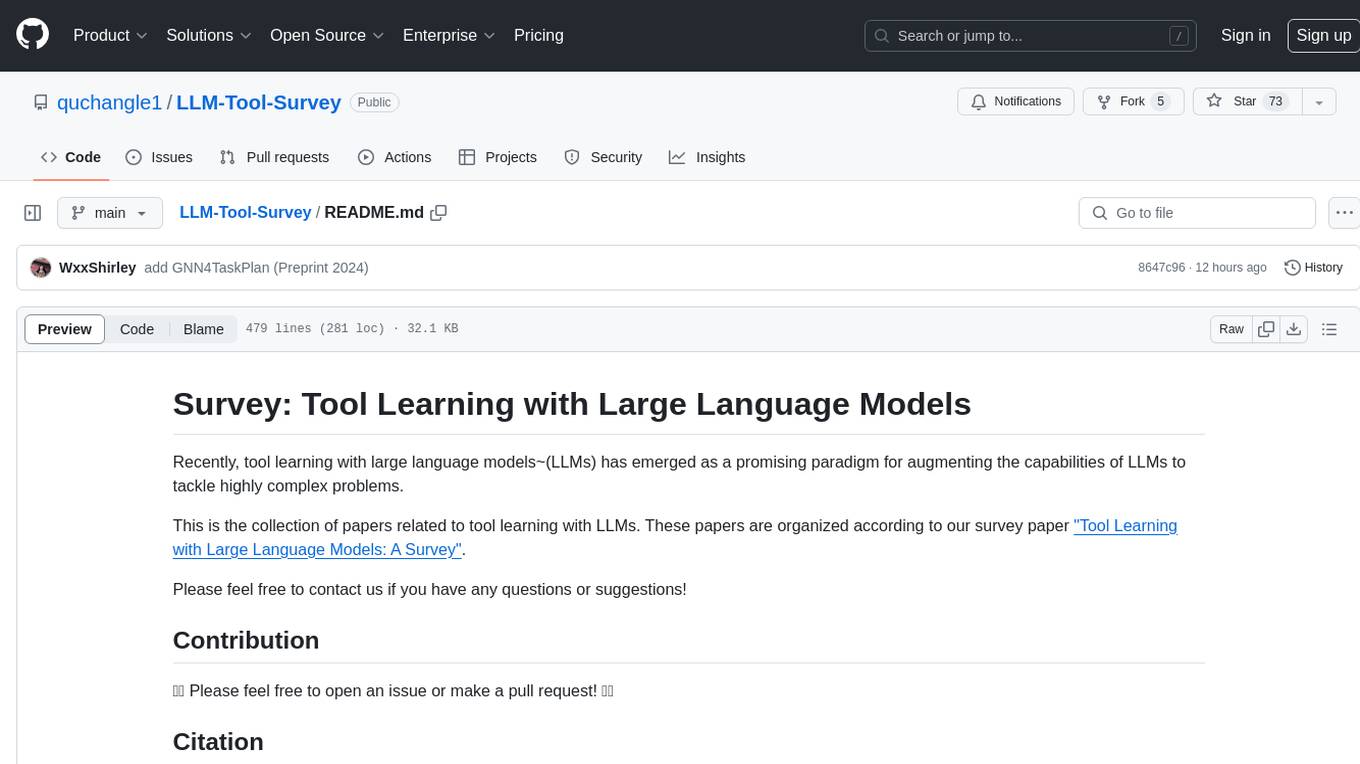
LLM-Tool-Survey
This repository contains a collection of papers related to tool learning with large language models (LLMs). The papers are organized according to the survey paper 'Tool Learning with Large Language Models: A Survey'. The survey focuses on the benefits and implementation of tool learning with LLMs, covering aspects such as task planning, tool selection, tool calling, response generation, benchmarks, evaluation, challenges, and future directions in the field. It aims to provide a comprehensive understanding of tool learning with LLMs and inspire further exploration in this emerging area.
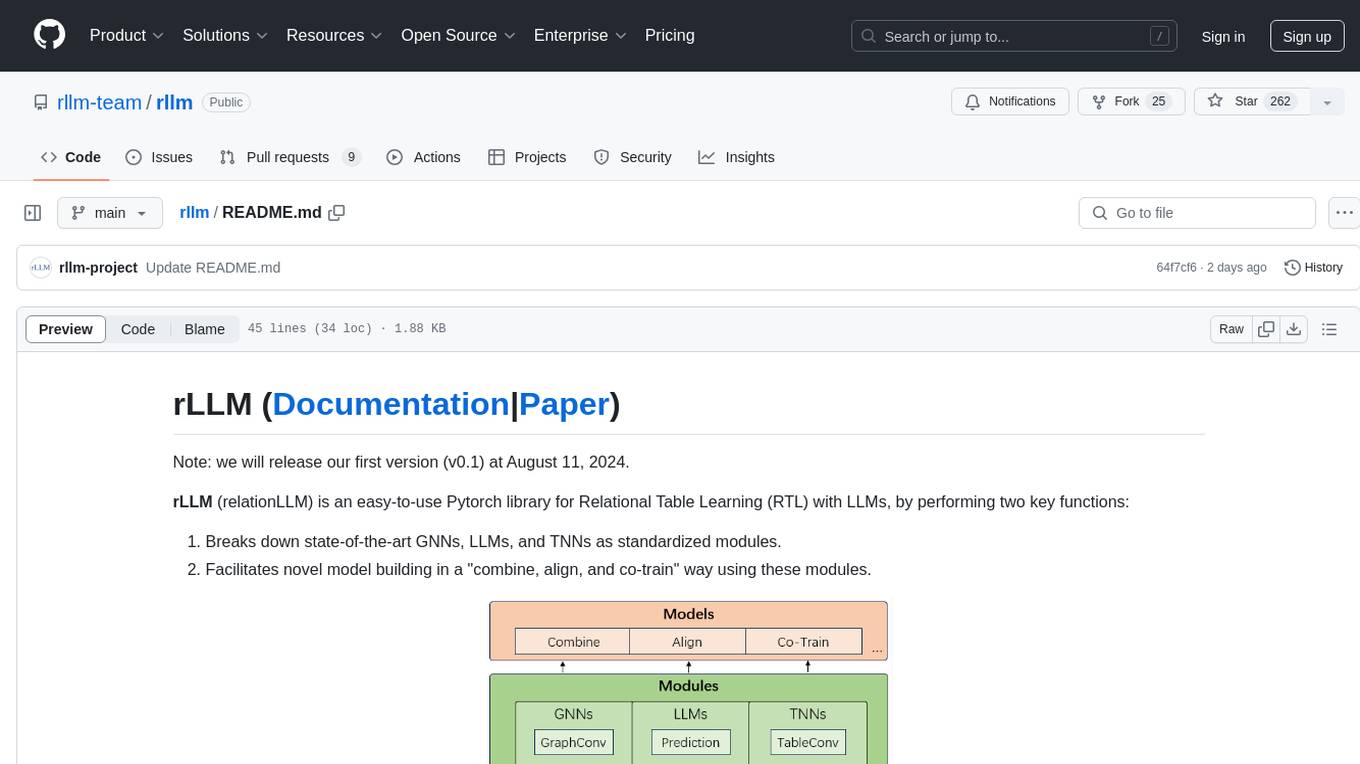
rllm
rLLM (relationLLM) is a Pytorch library for Relational Table Learning (RTL) with LLMs. It breaks down state-of-the-art GNNs, LLMs, and TNNs as standardized modules and facilitates novel model building in a 'combine, align, and co-train' way using these modules. The library is LLM-friendly, processes various graphs as multiple tables linked by foreign keys, introduces new relational table datasets, and is supported by students and teachers from Shanghai Jiao Tong University and Tsinghua University.
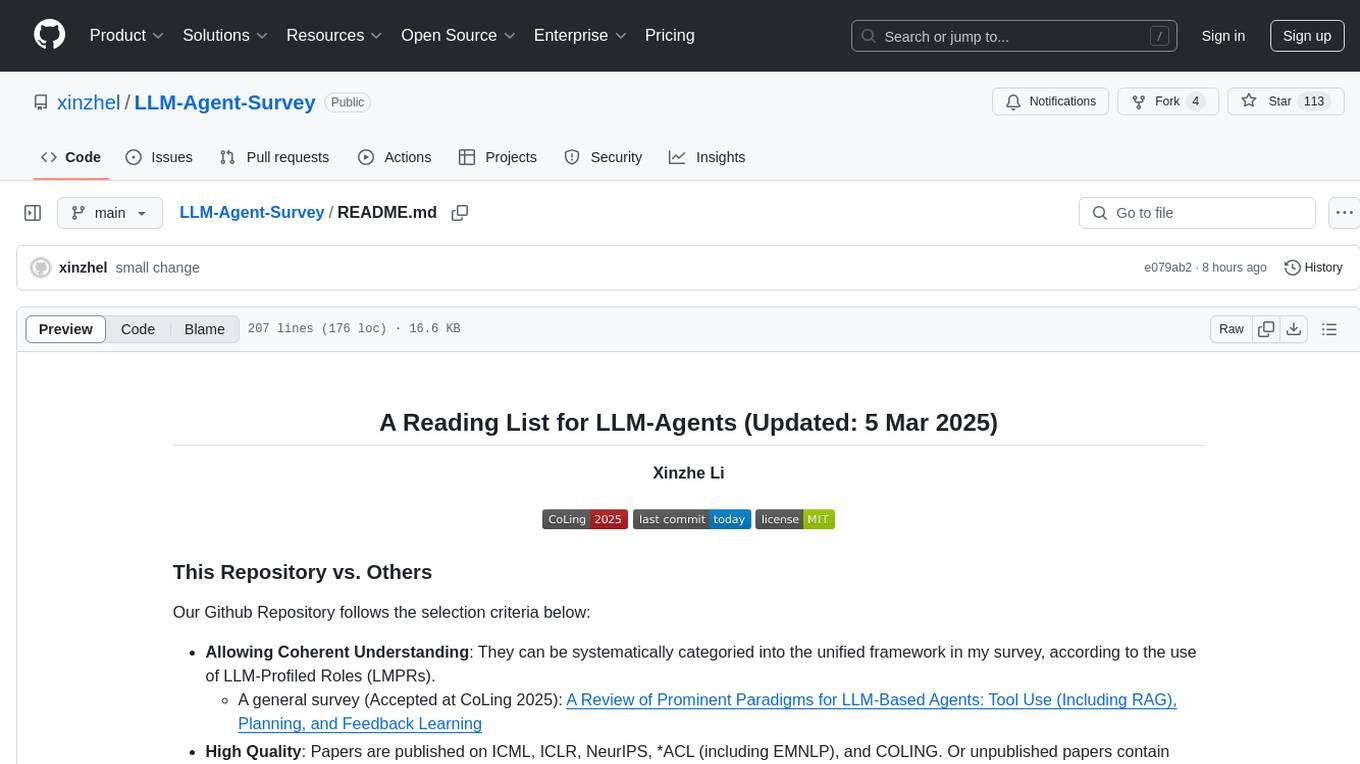
LLM-Agent-Survey
LLM-Agent-Survey is a comprehensive repository that provides a curated list of papers related to Large Language Model (LLM) agents. The repository categorizes papers based on LLM-Profiled Roles and includes high-quality publications from prestigious conferences and journals. It aims to offer a systematic understanding of LLM-based agents, covering topics such as tool use, planning, and feedback learning. The repository also includes unpublished papers with insightful analysis and novelty, marked for future updates. Users can explore a wide range of surveys, tool use cases, planning workflows, and benchmarks related to LLM agents.
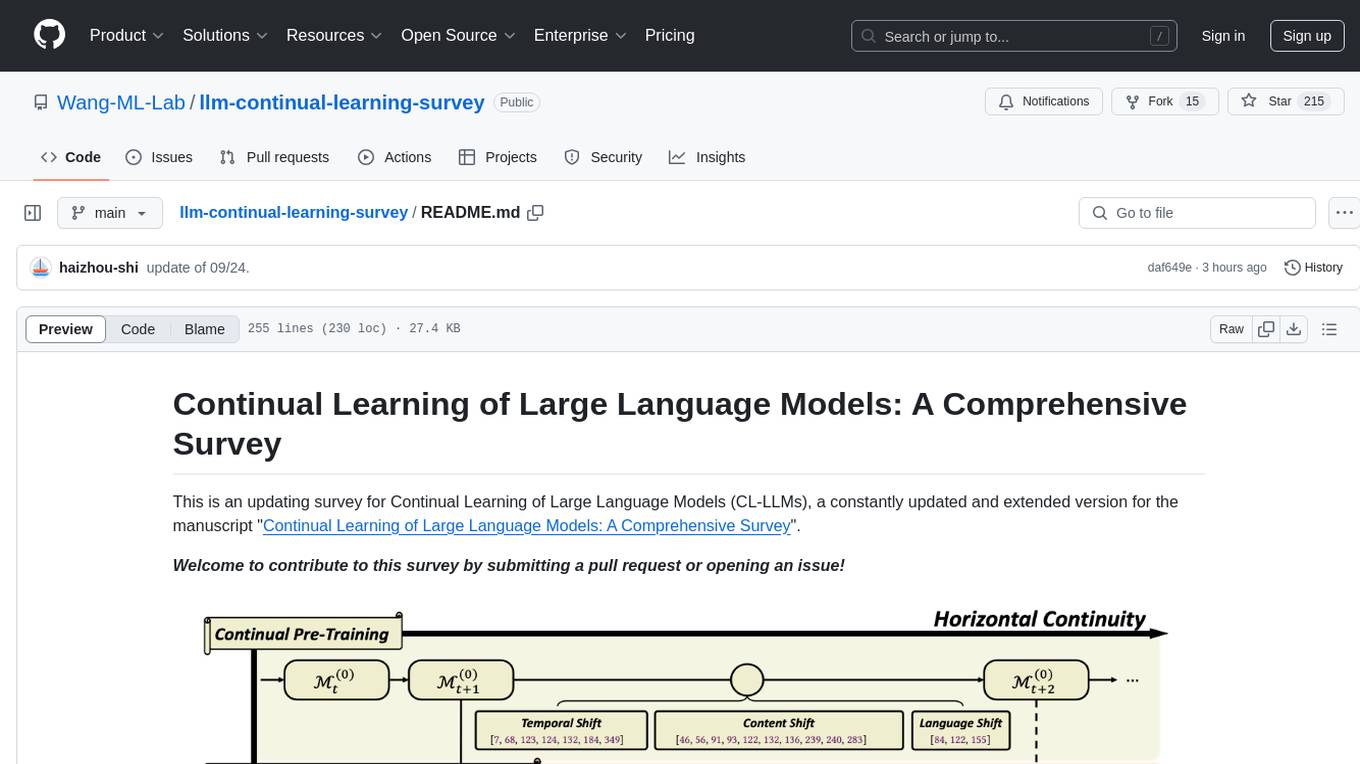
llm-continual-learning-survey
This repository is an updating survey for Continual Learning of Large Language Models (CL-LLMs), providing a comprehensive overview of various aspects related to the continual learning of large language models. It covers topics such as continual pre-training, domain-adaptive pre-training, continual fine-tuning, model refinement, model alignment, multimodal LLMs, and miscellaneous aspects. The survey includes a collection of relevant papers, each focusing on different areas within the field of continual learning of large language models.
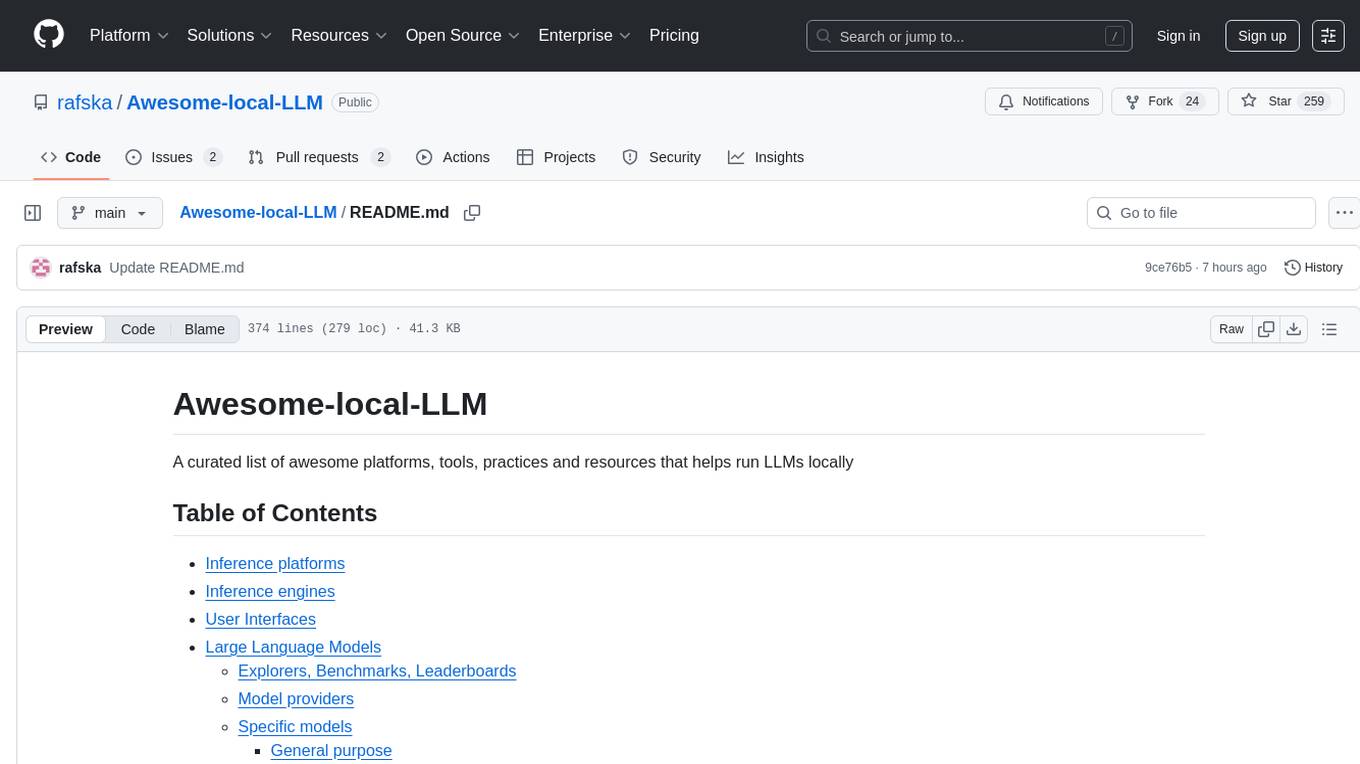
Awesome-local-LLM
Awesome-local-LLM is a curated list of platforms, tools, practices, and resources that help run Large Language Models (LLMs) locally. It includes sections on inference platforms, engines, user interfaces, specific models for general purpose, coding, vision, audio, and miscellaneous tasks. The repository also covers tools for coding agents, agent frameworks, retrieval-augmented generation, computer use, browser automation, memory management, testing, evaluation, research, training, and fine-tuning. Additionally, there are tutorials on models, prompt engineering, context engineering, inference, agents, retrieval-augmented generation, and miscellaneous topics, along with a section on communities for LLM enthusiasts.
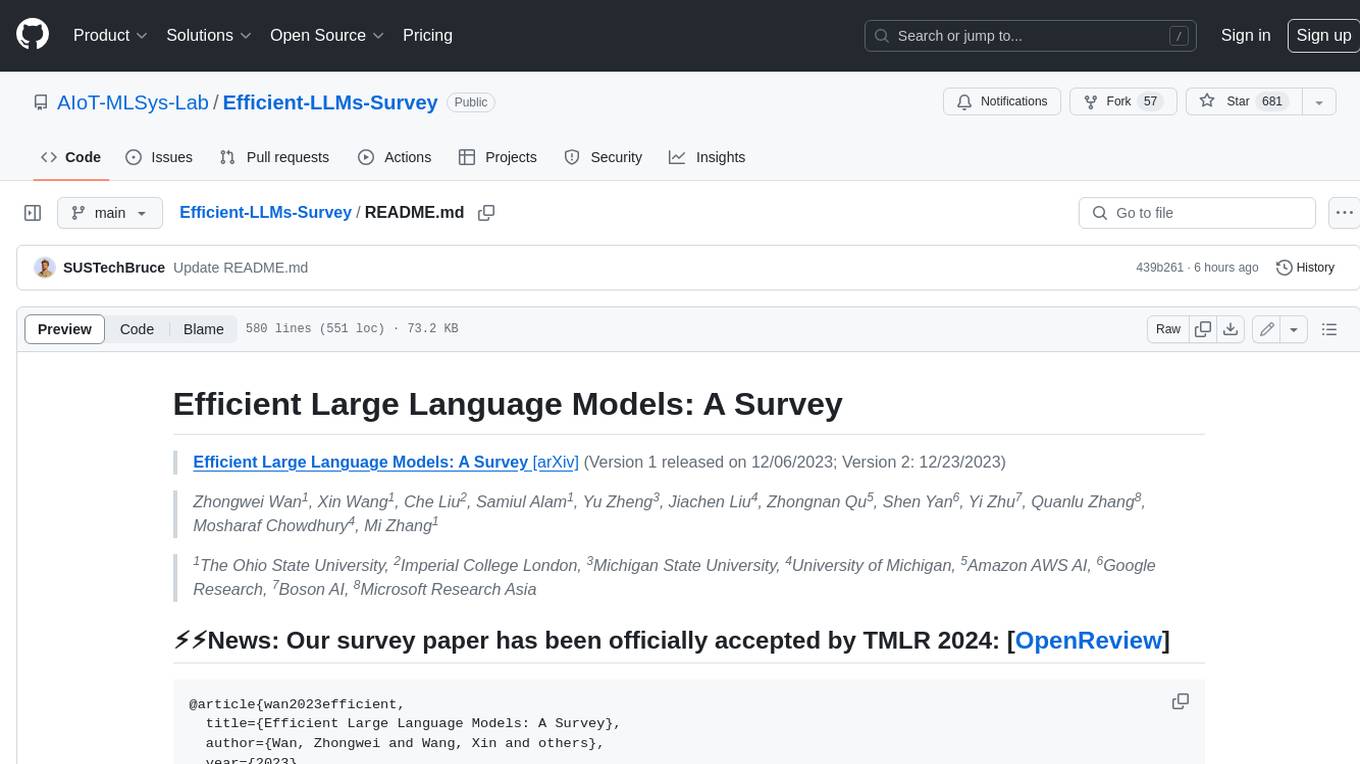
Efficient-LLMs-Survey
This repository provides a systematic and comprehensive review of efficient LLMs research. We organize the literature in a taxonomy consisting of three main categories, covering distinct yet interconnected efficient LLMs topics from **model-centric** , **data-centric** , and **framework-centric** perspective, respectively. We hope our survey and this GitHub repository can serve as valuable resources to help researchers and practitioners gain a systematic understanding of the research developments in efficient LLMs and inspire them to contribute to this important and exciting field.
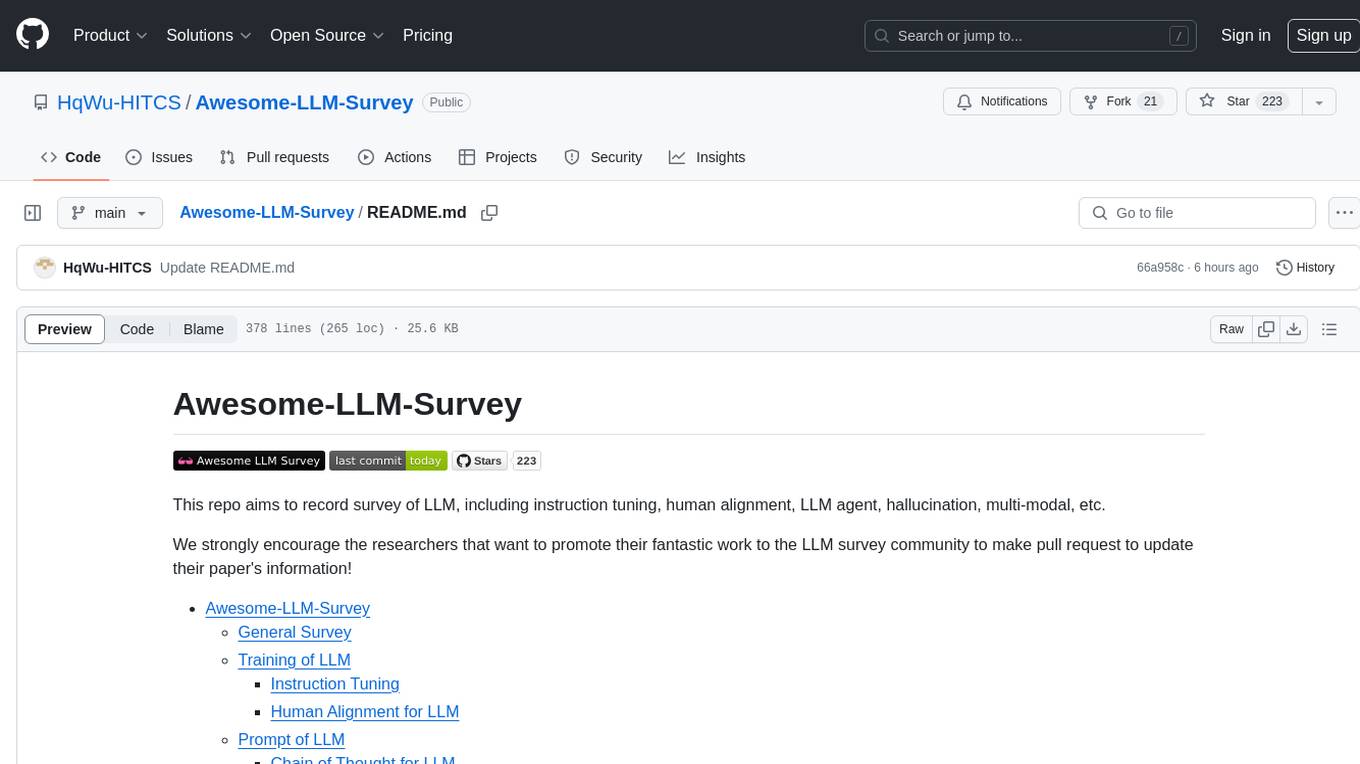
Awesome-LLM-Survey
This repository, Awesome-LLM-Survey, serves as a comprehensive collection of surveys related to Large Language Models (LLM). It covers various aspects of LLM, including instruction tuning, human alignment, LLM agents, hallucination, multi-modal capabilities, and more. Researchers are encouraged to contribute by updating information on their papers to benefit the LLM survey community.
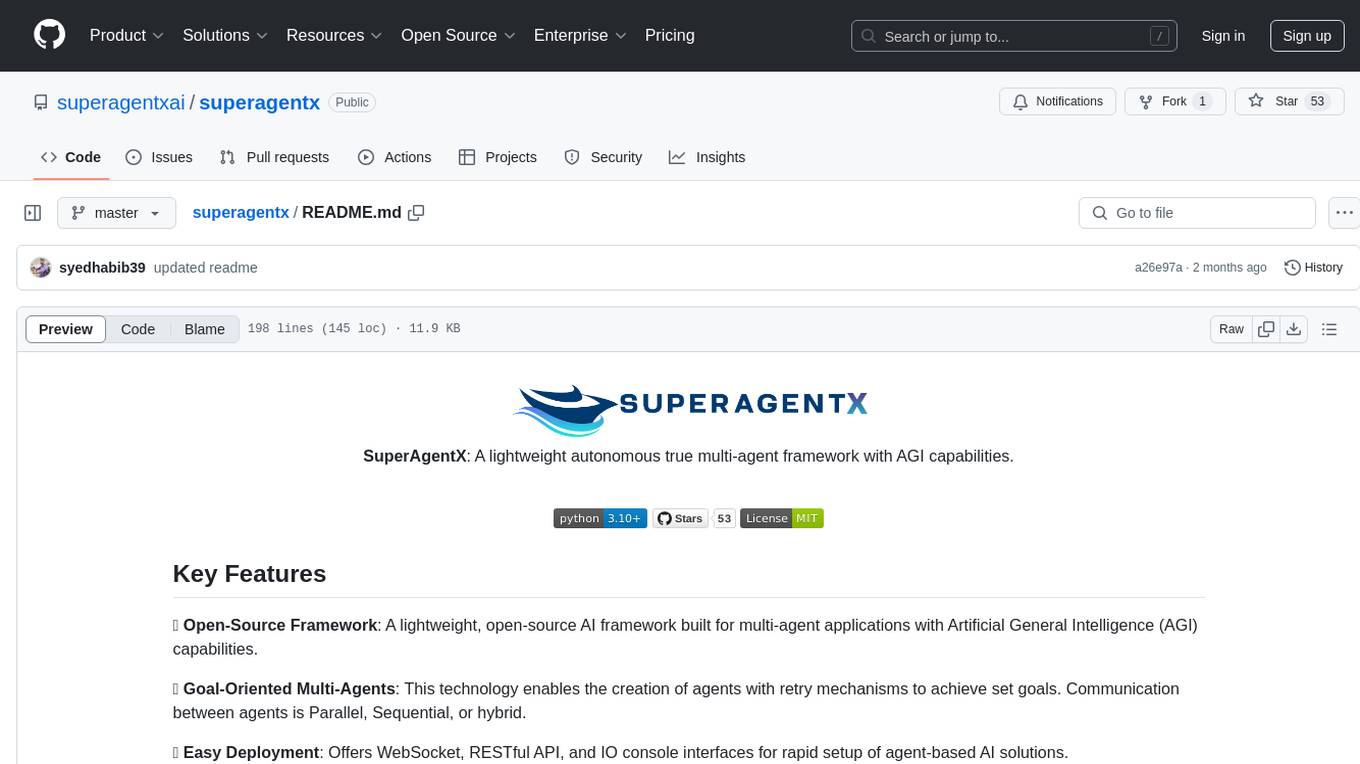
superagentx
SuperAgentX is a lightweight open-source AI framework designed for multi-agent applications with Artificial General Intelligence (AGI) capabilities. It offers goal-oriented multi-agents with retry mechanisms, easy deployment through WebSocket, RESTful API, and IO console interfaces, streamlined architecture with no major dependencies, contextual memory using SQL + Vector databases, flexible LLM configuration supporting various Gen AI models, and extendable handlers for integration with diverse APIs and data sources. It aims to accelerate the development of AGI by providing a powerful platform for building autonomous AI agents capable of executing complex tasks with minimal human intervention.
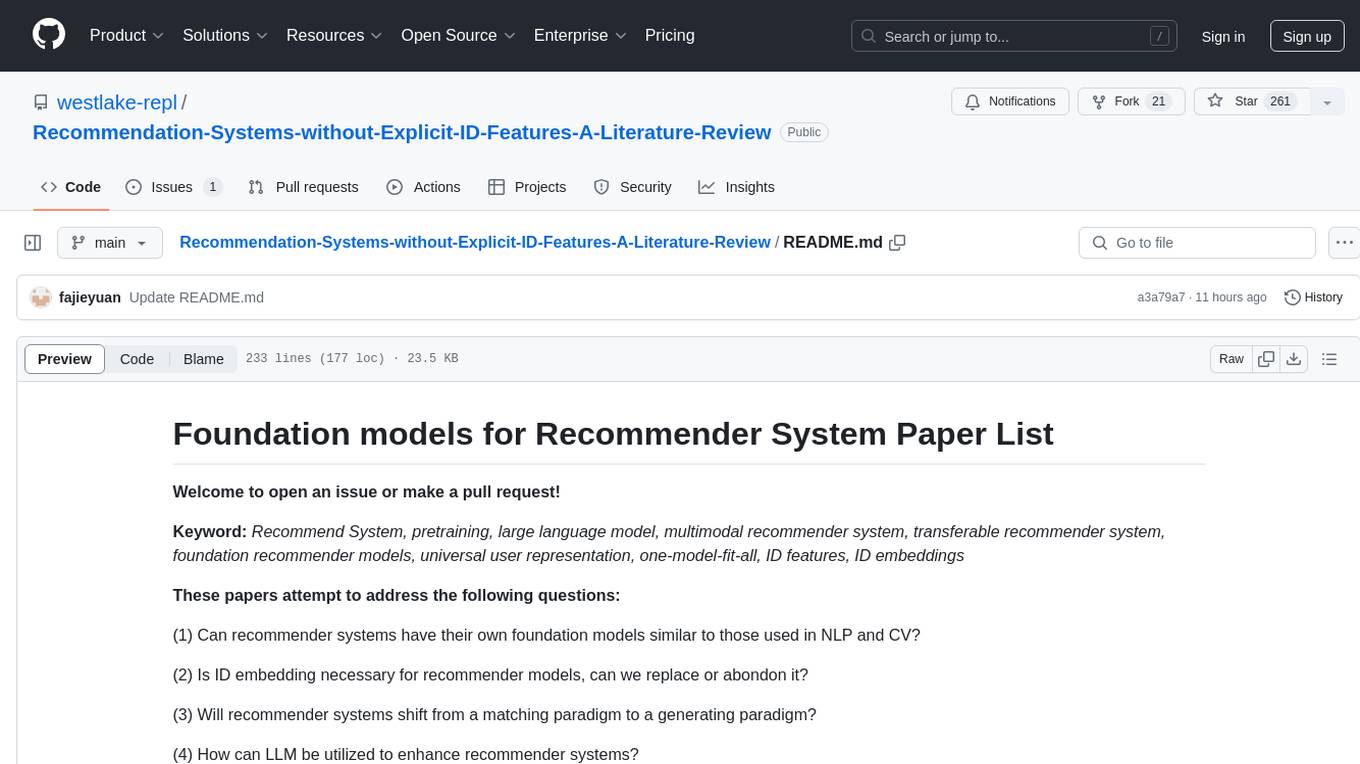
Recommendation-Systems-without-Explicit-ID-Features-A-Literature-Review
This repository is a collection of papers and resources related to recommendation systems, focusing on foundation models, transferable recommender systems, large language models, and multimodal recommender systems. It explores questions such as the necessity of ID embeddings, the shift from matching to generating paradigms, and the future of multimodal recommender systems. The papers cover various aspects of recommendation systems, including pretraining, user representation, dataset benchmarks, and evaluation methods. The repository aims to provide insights and advancements in the field of recommendation systems through literature reviews, surveys, and empirical studies.
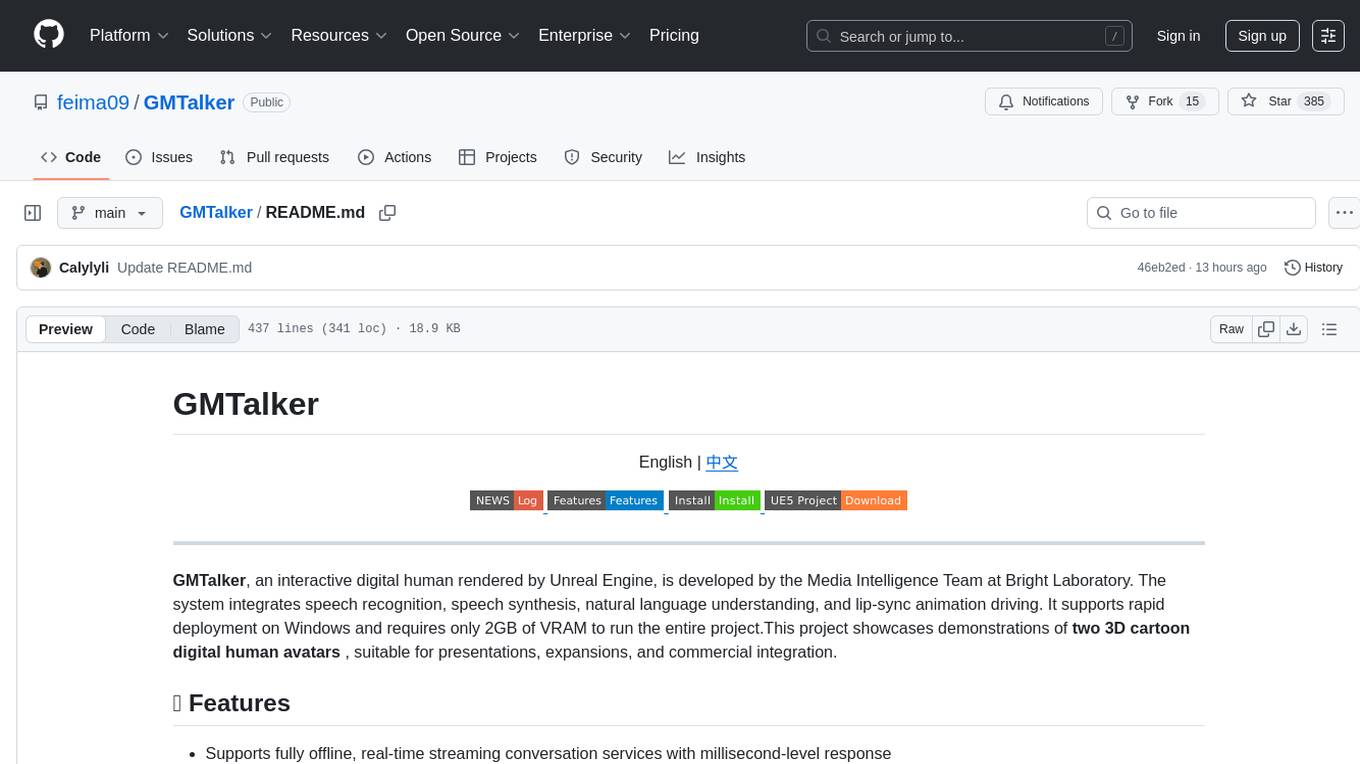
GMTalker
GMTalker is an interactive digital human rendered by Unreal Engine, developed by the Media Intelligence Team at Bright Laboratory. The system integrates speech recognition, speech synthesis, natural language understanding, and lip-sync animation driving. It supports rapid deployment on Windows with only 2GB of VRAM required. The project showcases two 3D cartoon digital human avatars suitable for presentations, expansions, and commercial integration.
For similar tasks

awesome-AIOps
awesome-AIOps is a curated list of academic researches and industrial materials related to Artificial Intelligence for IT Operations (AIOps). It includes resources such as competitions, white papers, blogs, tutorials, benchmarks, tools, companies, academic materials, talks, workshops, papers, and courses covering various aspects of AIOps like anomaly detection, root cause analysis, incident management, microservices, dependency tracing, and more.
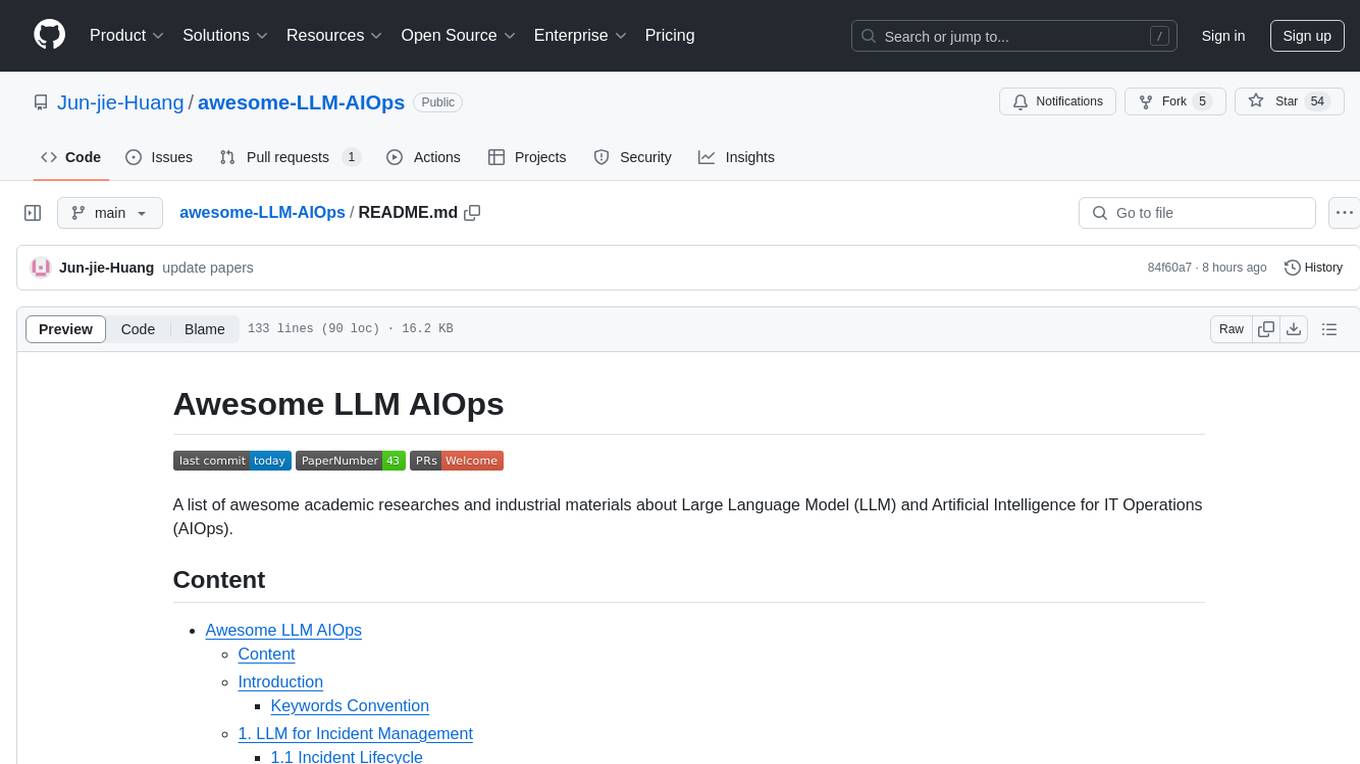
awesome-LLM-AIOps
The 'awesome-LLM-AIOps' repository is a curated list of academic research and industrial materials related to Large Language Models (LLM) and Artificial Intelligence for IT Operations (AIOps). It covers various topics such as incident management, log analysis, root cause analysis, incident mitigation, and incident postmortem analysis. The repository provides a comprehensive collection of papers, projects, and tools related to the application of LLM and AI in IT operations, offering valuable insights and resources for researchers and practitioners in the field.
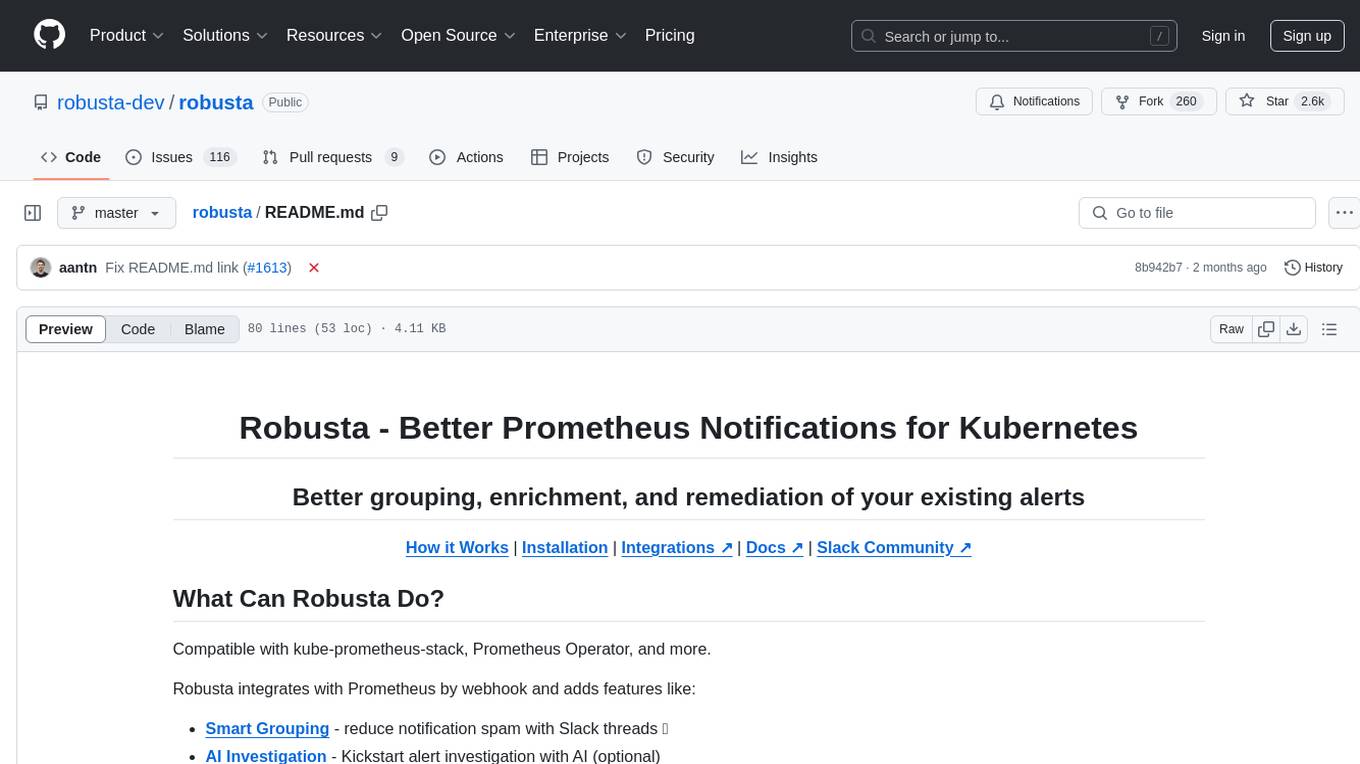
robusta
Robusta is a tool designed to enhance Prometheus notifications for Kubernetes environments. It offers features such as smart grouping to reduce notification spam, AI investigation for alert analysis, alert enrichment with additional data like pod logs, self-healing capabilities for defining auto-remediation rules, advanced routing options, problem detection without PromQL, change-tracking for Kubernetes resources, auto-resolve functionality, and integration with various external systems like Slack, Teams, and Jira. Users can utilize Robusta with or without Prometheus, and it can be installed alongside existing Prometheus setups or as part of an all-in-one Kubernetes observability stack.
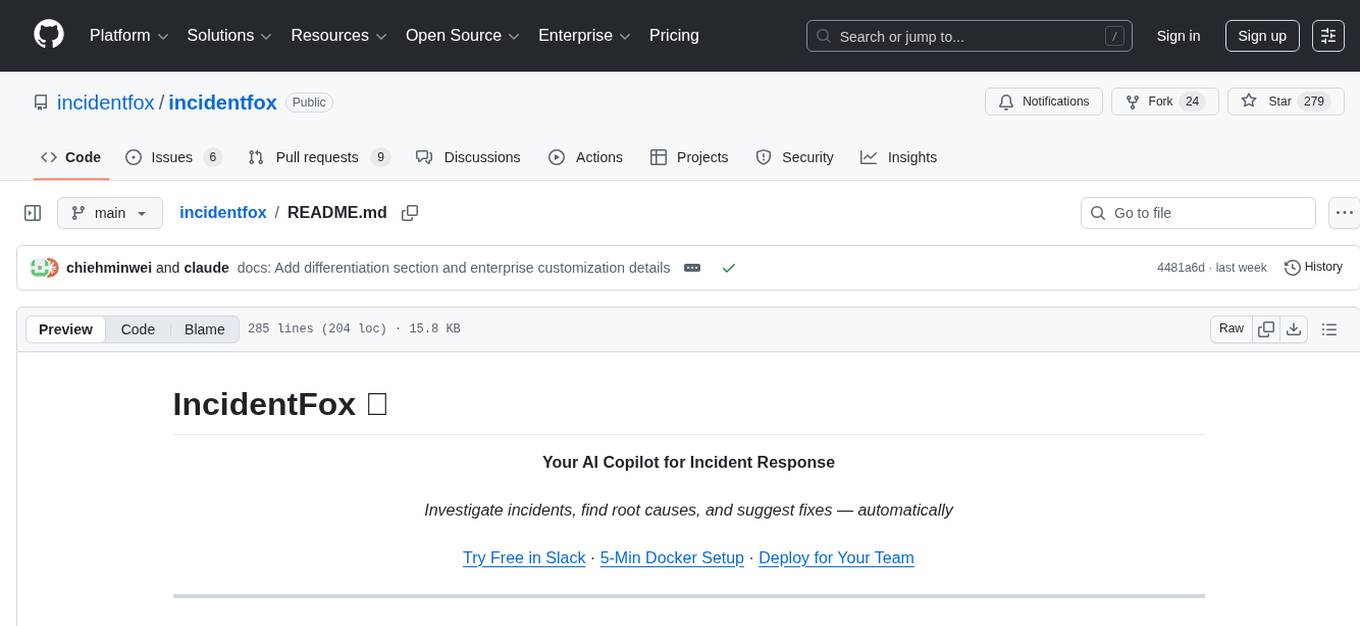
incidentfox
IncidentFox is an open-source AI SRE tool designed to assist in incident response by automatically investigating incidents, finding root causes, and suggesting fixes. It integrates with observability stack, infrastructure, and collaboration tools, forming hypotheses, collecting data, and reasoning through to find root causes. The tool is built for production on-call scenarios, handling log sampling, alert correlation, anomaly detection, and dependency mapping. IncidentFox is highly customizable, Slack-first, and works on various platforms like web UI, GitHub, PagerDuty, and API. It aims to reduce incident resolution time, alert noise, and improve knowledge retention for engineering teams.

qdrant
Qdrant is a vector similarity search engine and vector database. It is written in Rust, which makes it fast and reliable even under high load. Qdrant can be used for a variety of applications, including: * Semantic search * Image search * Product recommendations * Chatbots * Anomaly detection Qdrant offers a variety of features, including: * Payload storage and filtering * Hybrid search with sparse vectors * Vector quantization and on-disk storage * Distributed deployment * Highlighted features such as query planning, payload indexes, SIMD hardware acceleration, async I/O, and write-ahead logging Qdrant is available as a fully managed cloud service or as an open-source software that can be deployed on-premises.
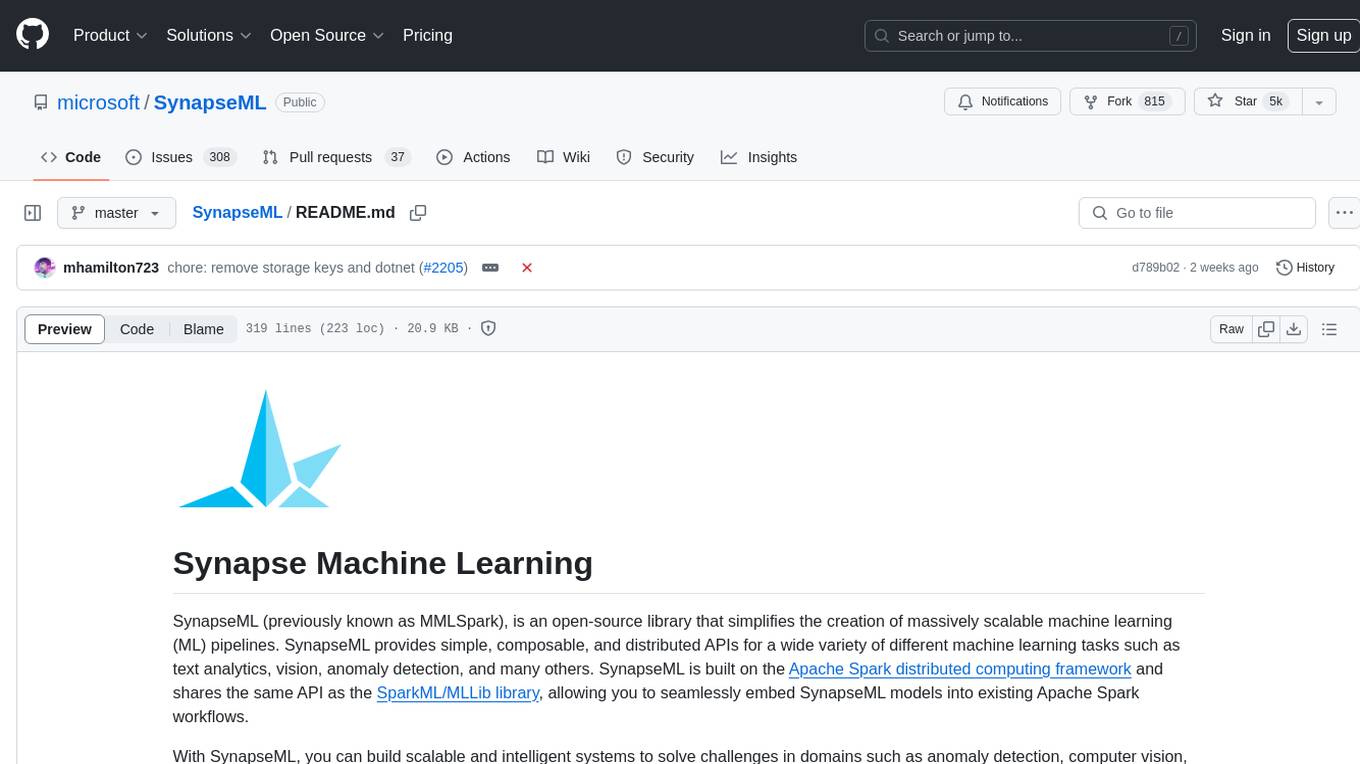
SynapseML
SynapseML (previously known as MMLSpark) is an open-source library that simplifies the creation of massively scalable machine learning (ML) pipelines. It provides simple, composable, and distributed APIs for various machine learning tasks such as text analytics, vision, anomaly detection, and more. Built on Apache Spark, SynapseML allows seamless integration of models into existing workflows. It supports training and evaluation on single-node, multi-node, and resizable clusters, enabling scalability without resource wastage. Compatible with Python, R, Scala, Java, and .NET, SynapseML abstracts over different data sources for easy experimentation. Requires Scala 2.12, Spark 3.4+, and Python 3.8+.
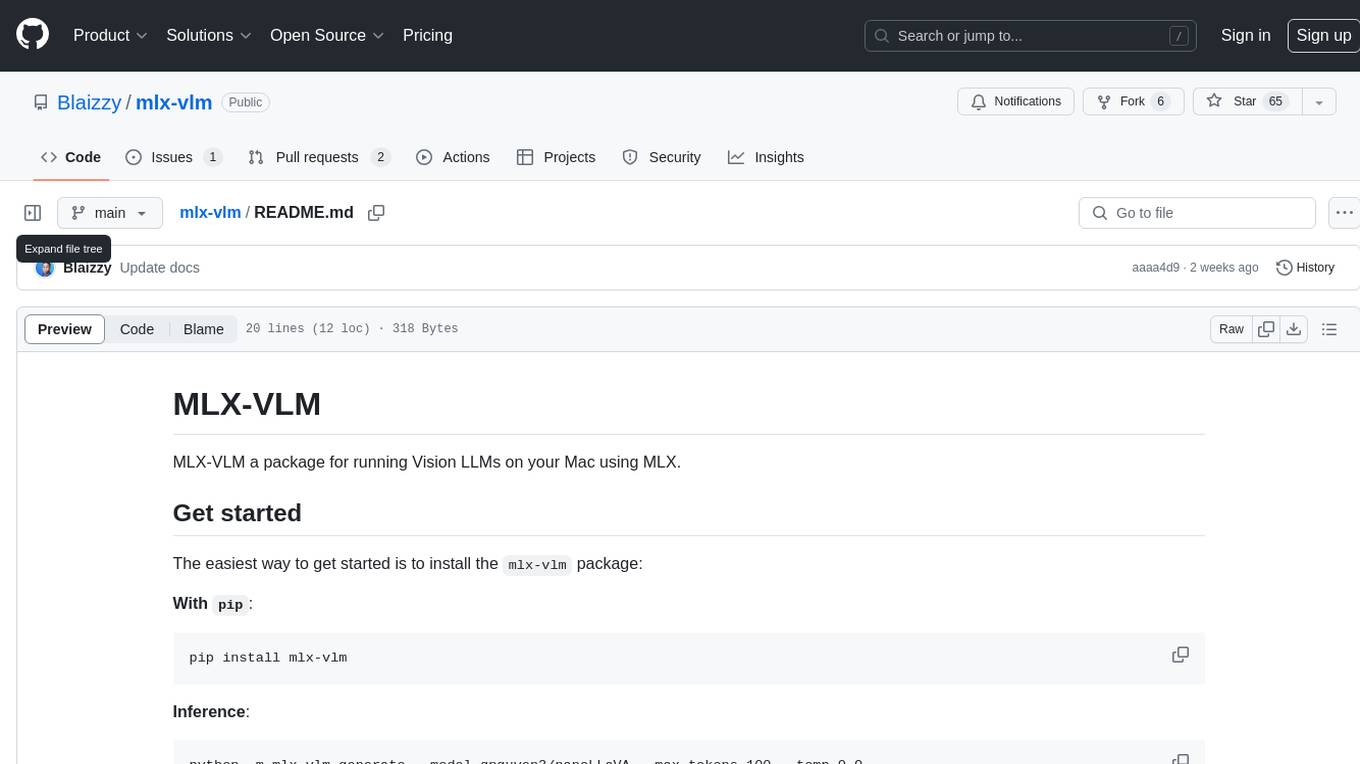
mlx-vlm
MLX-VLM is a package designed for running Vision LLMs on Mac systems using MLX. It provides a convenient way to install and utilize the package for processing large language models related to vision tasks. The tool simplifies the process of running LLMs on Mac computers, offering a seamless experience for users interested in leveraging MLX for vision-related projects.
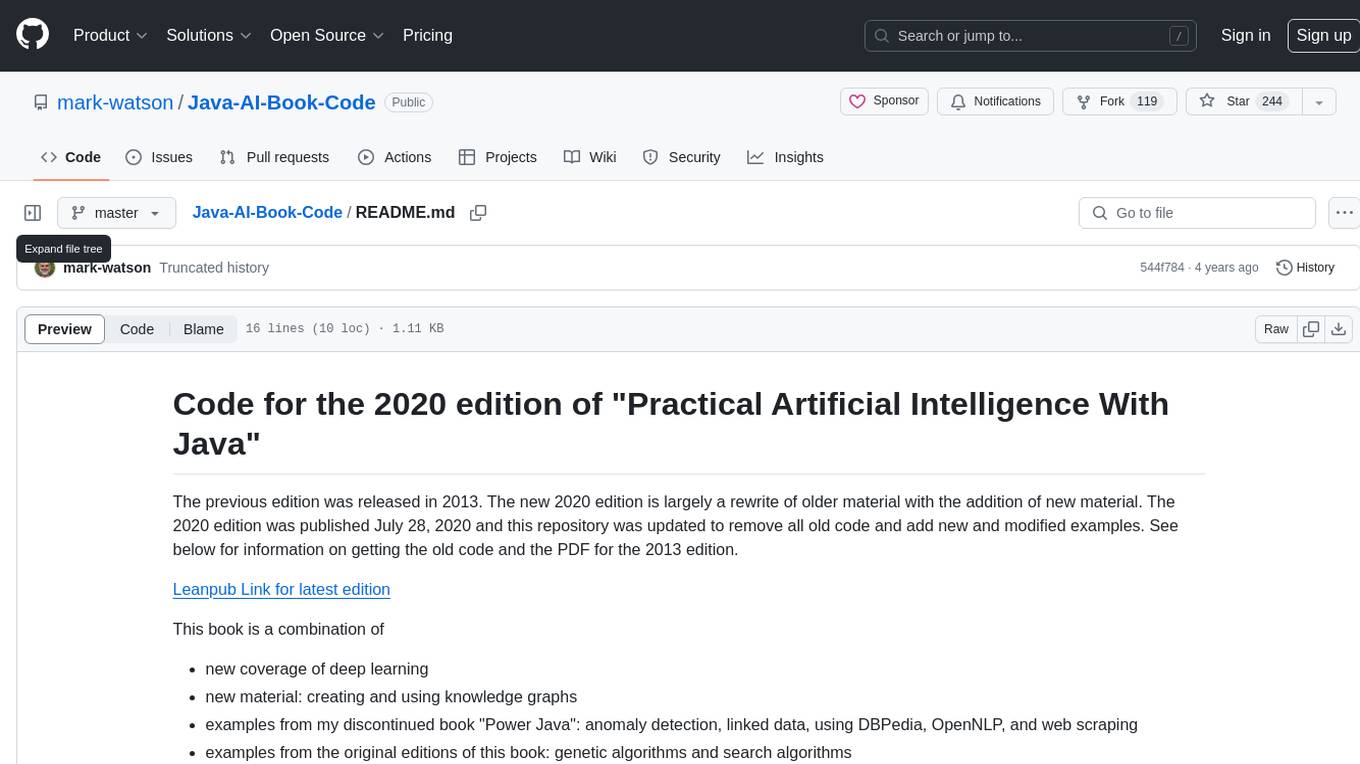
Java-AI-Book-Code
The Java-AI-Book-Code repository contains code examples for the 2020 edition of 'Practical Artificial Intelligence With Java'. It is a comprehensive update of the previous 2013 edition, featuring new content on deep learning, knowledge graphs, anomaly detection, linked data, genetic algorithms, search algorithms, and more. The repository serves as a valuable resource for Java developers interested in AI applications and provides practical implementations of various AI techniques and algorithms.
For similar jobs

sweep
Sweep is an AI junior developer that turns bugs and feature requests into code changes. It automatically handles developer experience improvements like adding type hints and improving test coverage.

teams-ai
The Teams AI Library is a software development kit (SDK) that helps developers create bots that can interact with Teams and Microsoft 365 applications. It is built on top of the Bot Framework SDK and simplifies the process of developing bots that interact with Teams' artificial intelligence capabilities. The SDK is available for JavaScript/TypeScript, .NET, and Python.

ai-guide
This guide is dedicated to Large Language Models (LLMs) that you can run on your home computer. It assumes your PC is a lower-end, non-gaming setup.

classifai
Supercharge WordPress Content Workflows and Engagement with Artificial Intelligence. Tap into leading cloud-based services like OpenAI, Microsoft Azure AI, Google Gemini and IBM Watson to augment your WordPress-powered websites. Publish content faster while improving SEO performance and increasing audience engagement. ClassifAI integrates Artificial Intelligence and Machine Learning technologies to lighten your workload and eliminate tedious tasks, giving you more time to create original content that matters.

chatbot-ui
Chatbot UI is an open-source AI chat app that allows users to create and deploy their own AI chatbots. It is easy to use and can be customized to fit any need. Chatbot UI is perfect for businesses, developers, and anyone who wants to create a chatbot.

BricksLLM
BricksLLM is a cloud native AI gateway written in Go. Currently, it provides native support for OpenAI, Anthropic, Azure OpenAI and vLLM. BricksLLM aims to provide enterprise level infrastructure that can power any LLM production use cases. Here are some use cases for BricksLLM: * Set LLM usage limits for users on different pricing tiers * Track LLM usage on a per user and per organization basis * Block or redact requests containing PIIs * Improve LLM reliability with failovers, retries and caching * Distribute API keys with rate limits and cost limits for internal development/production use cases * Distribute API keys with rate limits and cost limits for students

uAgents
uAgents is a Python library developed by Fetch.ai that allows for the creation of autonomous AI agents. These agents can perform various tasks on a schedule or take action on various events. uAgents are easy to create and manage, and they are connected to a fast-growing network of other uAgents. They are also secure, with cryptographically secured messages and wallets.

griptape
Griptape is a modular Python framework for building AI-powered applications that securely connect to your enterprise data and APIs. It offers developers the ability to maintain control and flexibility at every step. Griptape's core components include Structures (Agents, Pipelines, and Workflows), Tasks, Tools, Memory (Conversation Memory, Task Memory, and Meta Memory), Drivers (Prompt and Embedding Drivers, Vector Store Drivers, Image Generation Drivers, Image Query Drivers, SQL Drivers, Web Scraper Drivers, and Conversation Memory Drivers), Engines (Query Engines, Extraction Engines, Summary Engines, Image Generation Engines, and Image Query Engines), and additional components (Rulesets, Loaders, Artifacts, Chunkers, and Tokenizers). Griptape enables developers to create AI-powered applications with ease and efficiency.
